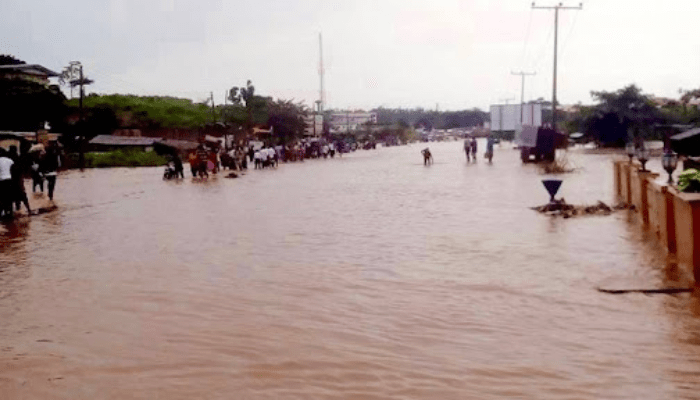At least 20 Nigerian states are at high risk of flash floods this July, the Nigerian Meteorological Agency (NiMet) has warned, even as concerns mount over the effective use of over ₦620 billion in ecological funds allocated to states in recent years.
In its July 2025 flood alert released on Monday, NiMet listed Sokoto, Kaduna, Zamfara, Yobe, Bauchi, Bayelsa, Jigawa, Adamawa, Taraba, Niger, Nasarawa, Benue, Ogun, Ondo, Lagos, Delta, Edo, Cross River, Rivers, and Akwa Ibom as states with “high probability” of experiencing serious flash flooding due to the intensifying rainfall across the country.
The agency advised residents in the identified areas to take precautionary measures such as clearing drainage systems, relocating from flood-prone zones, preparing emergency kits, and turning off electricity and gas supplies when necessary.
The warning comes amid renewed scrutiny over how state governments have spent ecological funds meant to strengthen resilience against environmental disasters. According to environmental groups and urban planning experts, despite receiving over ₦620 billion in ecological allocations, many states remain unprepared to manage recurrent flooding, leaving millions of residents exposed to avoidable destruction.
“This is not just about climate change—it’s about neglect,” said Dr. Tunde Alade, an urban infrastructure analyst. “Floods happen every year. So why are we still seeing the same level of devastation in states that have received huge federal allocations for ecological and environmental risk management?”
The warning coincided with a fresh wave of flooding in Ondo State over the weekend, following torrential rainfall on Friday, Saturday, and Sunday. Affected local government areas include Owo, Okitipupa, Ilaje, and Ese Odo, where communities such as Uso, Ayeka, Ikoya, Igbodigo, Igodan, and Igbotako reported extensive damage. Residents say buildings, bridges, and farmlands were submerged, with property losses running into millions of naira.
Community leaders in the state have appealed to the Ondo State government for immediate assistance and long-term solutions. “We can’t continue to live like this—rebuilding every year while the government looks away,” a resident of Ilaje told reporters.
The Africa Environmental Health Organisation and the Nigerian Institute of Town Planners have called for urgent audits into how ecological funds are being spent, and want future disbursements to be performance-based.
“With floods now an annual crisis, it’s time for accountability,” said Dr. Ifeoma Egwuatu of the AEHO. “We must link ecological fund access to evidence of proactive flood defence projects. Otherwise, we’ll keep recycling disaster headlines.”
With more heavy rains forecast for the weeks ahead, NiMet has warned that unless urgent interventions are made, the risk of lives and livelihoods being lost remains dangerously high.





